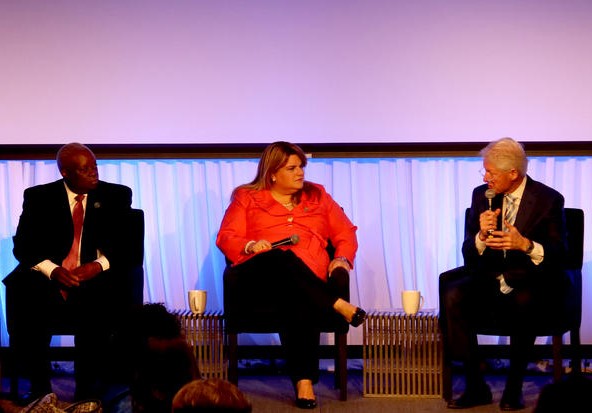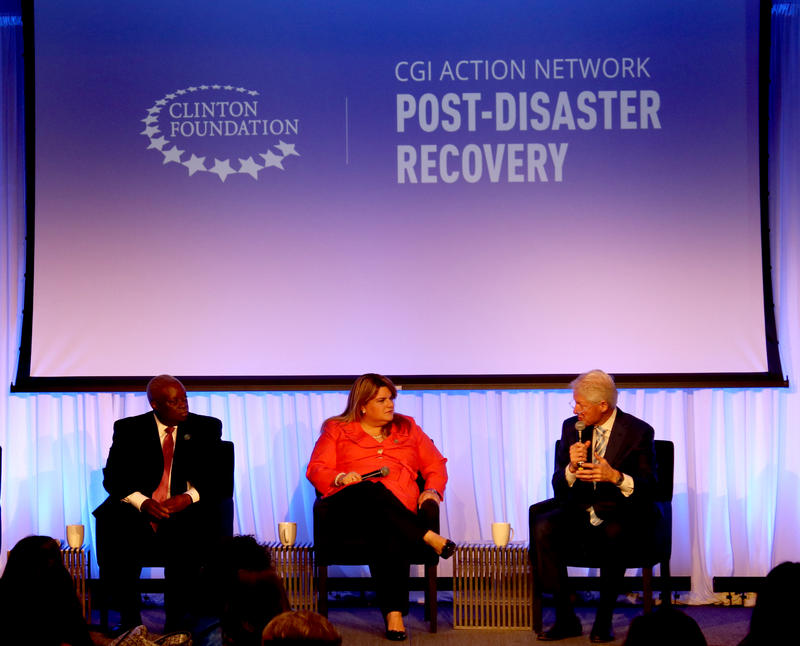MIAMI — It’s now been more than six months since Hurricanes Irma and Maria demolished the region.
Former President Bill Clinton brought his foundation to Coral Gables on Tuesday to propose ways to rebuild the Caribbean stronger.
Category 5 Hurricanes Irma and Maria caused $106 billion damage when they roared through the Caribbean last September in just two weeks. Small islands like Dominica and Barbuda were decimated; larger islands like Cuba and the U.S. commonwealth of Puerto Rico need years to recover.
But there is a growing consensus that the Caribbean has to rebuild differently this time. So Bill Clinton launched a Clinton Global Initiative Action Network at the University of Miami to showcase ways to make the islands more resilient. He said that’s urgent as storms get more powerful today.
“The [Caribbean] has many treasures,” Clinton said, “but it’s also one of the most vulnerable areas in the world to the ravages of climate change.”
Gov. Kenneth Mapp said that he expects the territory to receive about $7 billion from Congress. He will be able to rebuild and modernize schools and modernize the power supply by placing some lines underground.
“The money for the infrastructure is significant,” Mapp told the Miami Herald newspaper.
Sandra Goomansingh, the governor’s spokeswoman, reached for comment while traveling told the Virgin Islands Free Press this:
“The CGI works for the VI in several ways. First, President Clinton’s personal visit to the Virgin Islands has been followed up by the Clinton Foundation providing us a network of free technical support to provide for the modernization of power generation, distribution, hardening and resiliency of the territory’s power system. The Bloomberg Foundation is also assisting us with a finalizing a modernization strategy for the V.I. Water and Power Authority. The U.S. government is providing over $500 million dollars for the upgrades hardening and modernization of VIWAPA. This will reduce the cost of power from on average $0.33 pkwh to $0.14 pkwh, Gov. Mapp is honored and thankful for the work of President Bill Clinton, the Clinton and Bloomberg Foundations.”
Congresswoman Jenniffer González-Colón, Puerto Rico’s resident commissioner, said the U.S. and other donors have to find ways now to harden the region’s infrastructure.
“We’re not used to having a complete shutdown” after a hurricane, González-Colón said. “No power, no water, no telecom, no nothing. But we’re only patching up; we’re not rebuilding. We’re not putting a new system together.”
The CGI event, attended by several Caribbean leaders and hundreds of regional experts, discussed building those better energy grids, as well as other key societal pillars like agriculture and health services, to confront future disasters. Clinton also praised Dominica Prime Minister Roosevelt Skerrit’s $600 million plan to make his hard-hit island the world’s first climate-resilient nation.
“If this can be done,” Clinton said, “then the Caribbean can really begin to lead the world in a totally different direction.”
Clinton and his foundation, however, have a mixed record in the Caribbean. They’ve been widely criticized, for example, for their work in Haiti after its 2010 earthquake.
http://www.miamiherald.com/news/nation-world/world/americas/article207863989.html


